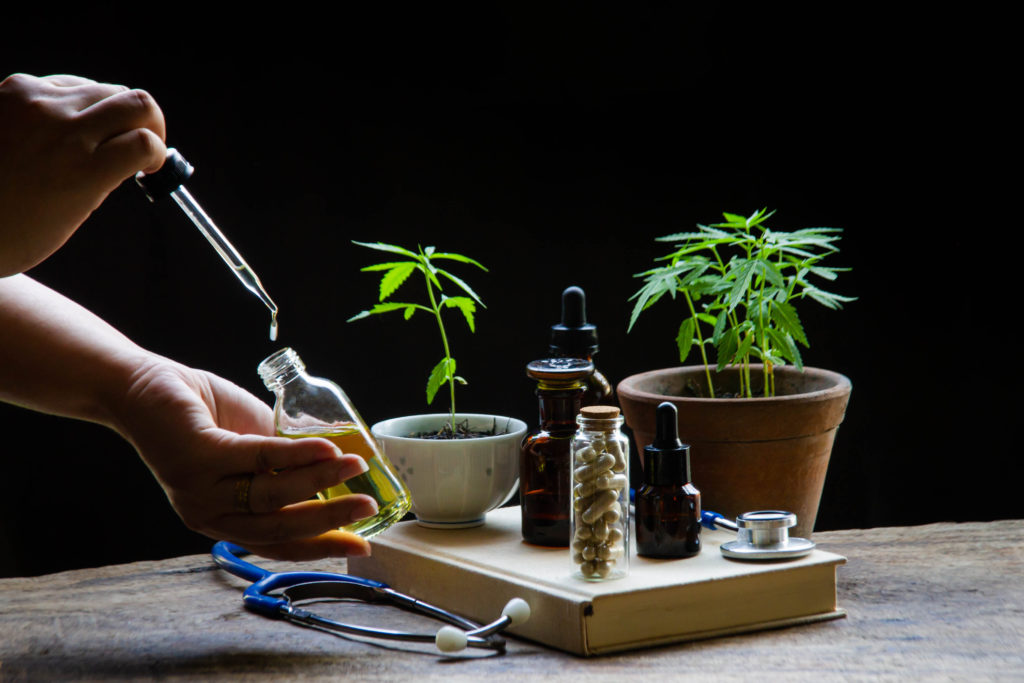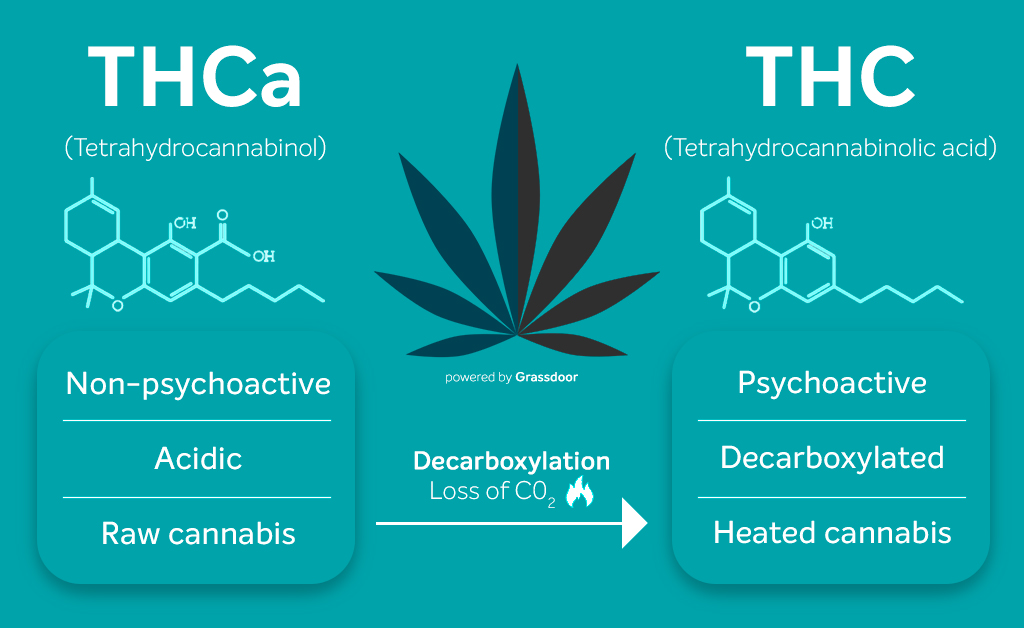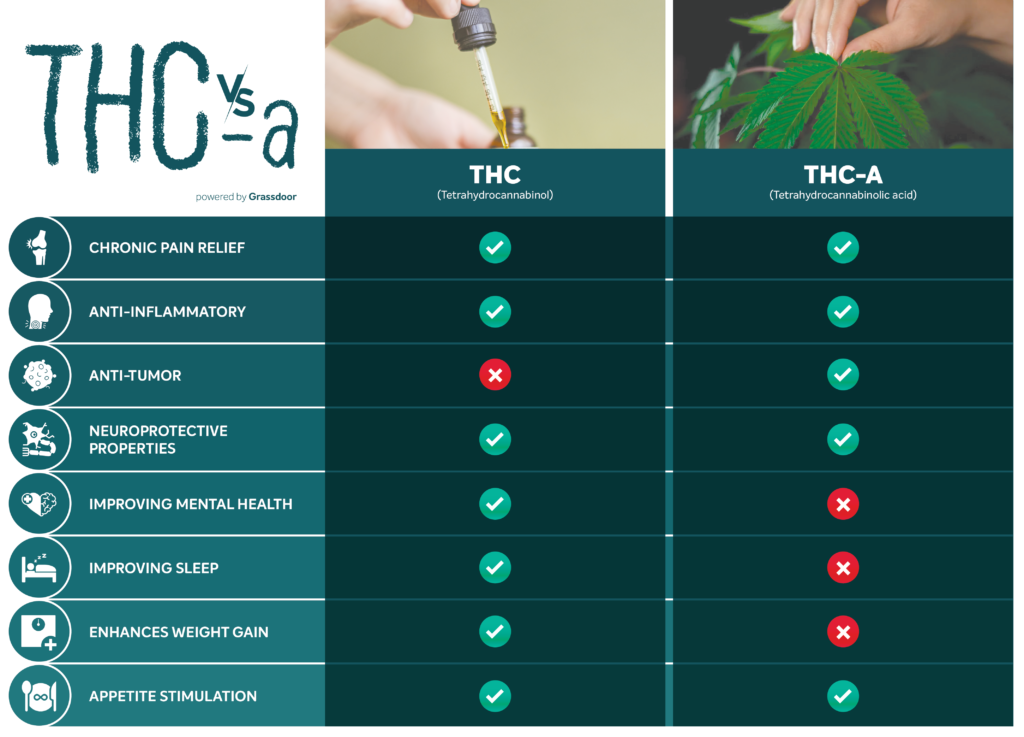
When it comes to the world of cannabis, THC and THCa are two names you’re bound to come across. But what exactly are they, and how are they different from each other? Well, buckle up because we’re about to embark on a wild ride to uncover the mystery of these two power players! So, grab your favorite canna treat, sit back, and dive into this intriguing blog article as we delve into the difference between THC and THCa.
THC Vs. THCa
What is THC?
THC, short for delta-9-tetrahydrocannabinol, is the chemical compound responsible for most of the psychoactive effects associated with cannabis. It’s the life of the party, and always ready to get the good times rolling.
When ingested or smoked, THC binds to the cannabinoid receptors in the brain and produces a range of effects. The level of THC in a cannabis plant varies and can impact the effects experienced by an individual. Apart from the euphoria it produces, THC offers therapeutic benefits as supported by cannabis studies, including,
- Alleviates pain and reduces inflammation
- Increases appetite and helps with weight gain
- Relieves anxiety and depression symptoms
- Helps with sleep issues
What is THCa?
THCa (tetrahydrocannabinolic acid) is a non-psychoactive compound found in raw or fresh cannabis plants. It is the precursor to THC and is not psychoactive in its natural form. THCa becomes THC through decarboxylation (we’ve demonstrated this in the diagram below), which occurs when the cannabis plant is dried, cured, or exposed to heat (such as smoking or vaporizing).

Preliminary results reveal how THCa has potential therapeutic benefits, such as:
- Anti-inflammatory effects: THCa displays anti-inflammatory properties, making it a potential treatment option for arthritis and other inflammatory diseases.
- Pain relief: It helps relieve pain and discomfort associated with various conditions, including chronic and neuropathic pain.
- Antitumor effects: THCa has exhibited anti-tumor properties in some studies, making it a promising treatment option for cancer patients.
- Neurological protection: It also offers some protection against neurological disorders and conditions, including Alzheimer’s disease and multiple sclerosis.
THC Vs. THCa: The Difference Between THC and THCa

So, what’s the difference between THC and THCa? Even though they are both naturally occurring compounds found in the cannabis plant, let us still point out the difference between THC and THCa.
Psychoactivity
THC is the primary psychoactive compound in cannabis, responsible for the “high” associated with marijuana use. THCa, however, is not psychoactive and produces no significant mind-altering effects.
Chemical Structure
THCa is an acidic form of THC, meaning it has a carboxyl group attached to the molecule. When THCa is decarboxylated (heated or exposed to light), it transforms into THC.
Medical Benefits
While THC and THCa have proven medical benefits, as supported by cannabis researchers, the specific benefits of each compound can differ. For example, THCa has anti-inflammatory properties, while THC is better known for its pain-relieving and anxiety-reducing effects.
Availability
THC is widely available in many forms, such as edibles, tinctures, and concentrates, but THCa is more difficult to find in its pure form.
So, to sum it up, THC is the wild child ready to party, while THCa is the shy, reserved extrovert (with plenty to offer once it opens up). But, with a bit of heat and attention, THCa can turn into the life of the party.
Does THCa Get You High?
Nope, THCa is the party pooper of the cannabis compounds! Unlike its more famous cousin, THC, THCa is non-intoxicating and will not produce a high. THCa is like the unripe fruit on the vine; it needs extra cooking to turn into the good stuff—THC. So if you’re looking for a memorable experience, THCa might not be the way to go. But don’t write it off entirely, as it still has some pretty impressive benefits.
What is a ‘Good’ THCa Percentage?
The ideal THCa percentage in cannabis can vary depending on the specific product and intended use. Generally, higher THCa percentages are considered desirable for those looking to utilize the potential therapeutic benefits of THCa, such as reducing inflammation and controlling seizures.
However, it is essential to note that factors such as strain, growing conditions, and processing methods can also influence the effects of THCa flower. Thus, you must seek guidance from a healthcare professional to determine the best THCa percentage for your needs, especially if you are smoking for the first time.
Are There Other Cannabinoid Acids?
In addition to THC and THCa, there are several other commonly known cannabinoid acids, such as the following:
- CBDA: Cannabidiolic Acid, a non-psychoactive compound, a precursor to CBD.
- CBGA: Cannabigerolic Acid, the parent molecule that produces THCa, CBDA, and CBCA.
- CBCA: Cannabichromenic Acid, a non-psychoactive compound, is a precursor to CBC.
- CBGVA: Cannabigerovarinic Acid, a precursor to CBGV.
THCa Vs. THC: The Battle of the Cannabinoids
We think it is paramount to understand the difference between THC and THCa to make informed decisions about the use of cannabis for medicinal or recreational purposes. Both THC and THCa have unique properties and potential benefits, making them essential components in the study and use of cannabis. We have talked about THCa benefits, and it’s incredible how these naturally occurring compounds in the cannabis plant can have diverse effects on our bodies. We think it is paramount to understand the difference between THC and THCa to make informed decisions about the use of cannabis for medicinal or recreational purposes.
Who knows, we may discover new compounds that offer even more benefits in the future, thanks to clinical explorations. Until then, keep exploring, learning, and toasting to the world of cannabis.

